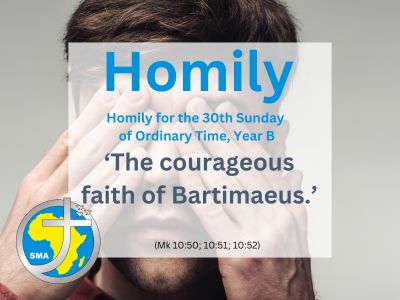Readings: Jeremiah 31:7-9, Hebrews 5:1-6, Mark 10:46-52
Theme: The courageous faith of Bartimaeus
Today’s gospel reading recounts one of the most fascinating miracle stories in Mark’s gospel, the healing of Bartimaeus, a blind beggar. The story illustrates the meaning of faith and discipleship. The reading opens with Jesus and his disciples on the final leg of their journey to Jerusalem. A large crowd of people are with them – pilgrims on their way to the Holy City for the great Jewish feast of Passover (Pesach). This annual feast celebrated the liberation of the Israelites from slavery in Egypt. Jesus and his companions are passing through Jericho – one the oldest cities in the world – when a blind man (Bartimaeus), sitting by the side of the road, hears all the commotion and wonders what is happening.
When he is told that Jesus of Nazareth is passing by, he shouts out, ‘Jesus, Son of David, have pity on me!’ (Mk 10:47). We presume that Bartimaeus has heard of Jesus’ reputation as a miracle worker. At first, some of the crowd tell him to be quiet. Despite his infirmity they have little sympathy for him. In their eyes, he is just a nuisance, a nobody who should be ignored, and certainly not allowed to interrupt Jesus on his way to Jerusalem to fulfil his messianic mission. But Bartimaeus will not be silenced. Determined to get Jesus’ attention, he continues to call out even more loudly, ‘Jesus, Son of David, have mercy on me! Moved by his heartfelt cries, Jesus stops and calls for him to come towards him. Now the mood in the crowd changes dramatically, They are all behind Bartimaeus encouraging him: ‘Courage, they said, get up; he is calling you’ (Mk 10:49). So, throwing his cloak aside, he jumps up and goes to Jesus.
But Jesus not only wants Bartimaeus to come to him. He wants him to say clearly what he desires Jesus to do for him: ‘What do you want me to do for you?’ (Mk 10:51). Bartimaeus may be blind and impoverished, but he is a man who knows what he wants, so without the slightest hesitation he replies: ‘Master, let me see again’ (Mk 10:50). And, there and then, Jesus heals him, saying: ‘Go, your faith has saved you’ (Mk 10:52). The response of Bartimaeus to having his sight restored is the climax of the story. Unlike the man of great wealth who went away sad, he does not go away. Instead, he becomes a disciple of Jesus and follows him along the road (cf. Mk 10:52).
In this story Mark is presenting Bartimaeus as a model of faith and discipleship. Just before healing him Jesus tells Bartimaeus that it is his faith that has saved him. But what is this faith? It is a faith manifested more by what he does than by what he says. We see it in his recognition of his need, his unwavering conviction that Jesus can and will heal him, and his courage to leave behind his past and follow Jesus.
Recognising his need of healing Bartimaeus continues to cry out to Jesus even when some people demand him to be silent. Despite being on the bottom rung of the social ladder, he will not shut up. He will not be cowed into silence. How easily we are cowed into silence by the crowd, whereas, like Bartimaeus, we should be clamouring to be heard and give expression to our genuine needs and the needs of those around us who often suffer in silence!
Unlike James and John in last Sunday’s gospel reading, who wanted places of prestige beside Jesus in his glory, Bartimaeus has the insight and wisdom to ask for what he truly needs. In response to Jesus’ question: ‘What do you want me to do for you?,’ his reply is the simple request ‘That I would see again’. Bartimaeus knows that Jesus has come now to bestow power and honour but to open our eyes to the ‘new earth and new heaven’ make possible by the reign of God’s love in the world. When it comes to understanding the mission of Jesus Bartimaeus is way ahead of the sons of Zebedee. Like Bartimaeus we need to recognise what we truly need and ask for it with humility and trust.
Bartimaeus truly believes that Jesus can and will heal him. So, he casts aside his cloak and approaches Jesus, confident that he will cure him. Blind beggars would normally tend to hold on to their few possessions, especially a cloak which would protect him from the cold of night. However, Bartimaeus casts his one precious possession because he knows in his heart that he will no longer need it. No longer will be be dependent on handouts from passers-by. His status is about to change radically.
Finally, Bartimaeus, following his healing, has the courage to follow Jesus on the road to Jerusalem. He is a man transformed by his encounter with Jesus. From being blind, he can now see, spiritually as well as physically. He knows clearly where he is going and who he is following. From being a dependent beggar, he is now a free man greatly enriched by what he has received from Jesus. No longer sitting passively by the roadside hoping to receive alms, he is now walking with Jesus on the road. And this road leads to Jerusalem, that is, to suffering, death and resurrection. So we pray: Lord grant us the insight to discern what we truly need, the humility to ask for it with trust and confidence, and the courage to follow you all the way to Jerusalem. Amen.
Listen to an alternative audio:

